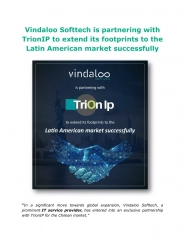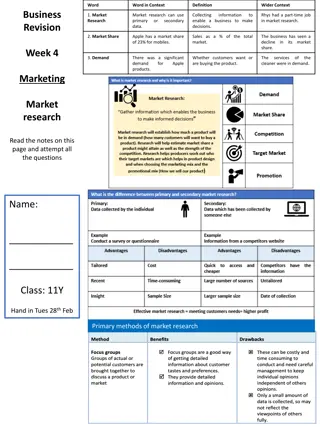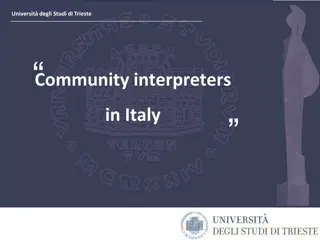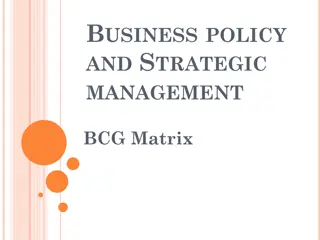Understanding the Chilean Market: Business and Cultural Insights
Explore key market factors, entry strategies, challenges, and the importance of finding the right partner when entering the Chilean market. Learn about market approaches, working with agents, and the unique business landscape in Chile, including competition, market size, and the role of economic groups. Gain insights into cultural nuances and essential considerations for successful market entry into Chile.
Uploaded on Sep 17, 2024 | 1 Views
Download Presentation

Please find below an Image/Link to download the presentation.
The content on the website is provided AS IS for your information and personal use only. It may not be sold, licensed, or shared on other websites without obtaining consent from the author. Download presentation by click this link. If you encounter any issues during the download, it is possible that the publisher has removed the file from their server.
E N D
Presentation Transcript
THE CHILEAN MARKET BUSINESS & CULTURAL APPROACH
MAIN FACTS Total Area: 756,950 km Currency: peso (1 = $750) Population: 17.8 million Density: 24 habitants/km2 Life Expectancy: 81.7 years Literacy: 98.55 % Centralised country, 15 regions
MARKET APPROACH Initial market survey be informed Prospection trip personal contacts Trade fairs, e.g. EXPOMIN 2018 (Chile) Consider local presence
KEY MARKET FACTORS Price is important Price-competitive products from places such as Taiwan, China, India or South Korea Quality, durability, innovation, customer support and availability of service are key factors All sales materials should be in Spanish
MARKET ENTRY --- STRATEGY Agent or a representative with good access to relevant buyers and solid technical expertise Local subsidiary or branch office in Chile if a large sales volume requiring local service support or localized inventory
MARKET ENTRY --- CHALLENGES High degree of competition Relatively small market size Its open trade and investment policy has attracted the attention of many foreign firms Chile is open to new products and technology, BUT Chilean business people tend to be more conservative and cautious than the average European business person
MARKET ENTRY --- YOUR PARTNER What can your agent or distributor do for you? Use their business and social connections Open doors to end-clients Overcome regulatory, cultural and language barriers IMPORTANT: A small number of economic groups and families control most of Chilean businesses
WORKING WITH AN AGENT Commissions: 5% to 10% Relationships are the key --- select the RIGHT agent Due diligence: qualifications, reputation, capabilities
SELLING TO THE GOVERNMENT The Government of Chile procurement website (www.chilecompra.cl) was established in March 2000 to increase transparency, to get better opportunities, and reduce government procurement costs Bidding is best done through a local agent who is registered, well connected, and familiar with Chilean government bidding procedures
IMPORTS & PRICING Pricing starts with the CIF value E.U.- Chile FTA: elimination of tariffs (95% of goods, otherwise general tax = 6%) Margins for consumer goods: 30% to 50% VAT/IVA = 19% Tariffs & VAT usually paid by importer Luxury goods & alcohols: higher taxes Certificate of Origin EUR.1 is necessary
IMPORT REQUIREMENTS Commercial invoices, certificates of origin, bills of lading, freight insurance and packing lists Special permission, certificates, and approval documents, such as sanitary and phytosanitary certificates, are required for most agricultural products and in special cases for industrial products For documentation requirements specific to agricultural imports, see the SAG website www.sag.cl
LABELLING & MARKING Labelling must be in Spanish and measurements must be in the metric system Products must display the country of origin Must be marked to show the quality, purity, ingredients or mixtures, and the net weight or measure of the contents
FOOD LABELLING Law 20606 (26/06/2015) regulates the labelling of the nutritional compositions of food products Target: food products for children under 14 years of age that exceed specified limits of sodium, sugar, calories and saturated fats --- enforced since 27/06/2016 Black stop sign shaped labels with the legend High in salt, sugar, energy or saturated fat
PROMOTION & ADVERTISING Broadcast media in Chile includes: open broadcast television networks/local TV stations cable and satellite TV networks, radios, newspapers and magazines which reinforce in-store merchandising methods Most advertising is handled by private agencies the majority belongs to the Chilean Association of Advertisement Agencies (ACHAP) www.achap.cl.
SALES SERVICE/CUSTOMER SUPPORT Any product that requires operator training or needs after-sales technical service must have a qualified local company ready and able to assist the customer Due to Chile s relatively close-knit society, company reputations can be made or lost in a fairly short period of time
PROTECTING INTELLECTUAL PROPERTY Rights must be registered and enforced in Chile, under local laws Due diligence on potential partners is a must (Central Bank of Chile: www.bcentral.cl) A good partner is an important ally in protecting IP rights. Be aware: allowing your partner to register your IP rights on your behalf may create the risk that your partner will list itself as the IP owner
METHODS OF PAYMENT In Chile, payment to foreign suppliers is often made via an irrevocable letter of credit from a Chilean commercial bank: payments are made upon receipt of notice of shipment of goods Other methods of payment to suppliers include cash against documents and open account The credit insurance industry is developed in the country and major private agencies such as Mapfre, Continental, and Coface have local offices in Santiago
FOREIGN EXCHANGE CONTROLS No restrictions on incoming and outgoing foreign capital Currency may be freely traded in two markets: the informal market and the interbank market (formal) Prior to receiving authorization, Chile s Central Bank requires confirmation that the trade finance transactions, foreign loans, capital flows, and profit repatriation will be executed through a commercial bank (formal market)
INVESTMENT CLIMATE Very positive attitude toward FDI = key to growth Very few restrictions upon FDI Chile has signed 55 BITs, of which 41 are in force Agreement in force with Belgium http://www.ciechile.gob.cl/en/guia-del-inversionista/
ESTABLISHING AN OFFICE Via traditional means with a Chilean attorney US$1,500 for legal fees and US$300 for expenses such as notary public, commercial registry, and the official gazette publication Or via self-service online, user-friendly and free (other than a fee of approximately US$10 for notary public expenses) to create a new business in 24 hours: www.tuempresaenundia.cl
JOINT VENTURE/LICENSING In Chile, joint ventures and licensing arrangements require the participation of a legally established local partner who can be responsible for Chilean legal and tax obligations.
SOCIOPOLITICAL CLIMATE Low levels of civil disturbance and terrorist activity --- little impact on the economy Indigenous communities --- growing trend of violent incidents related to the land claims of the Mapuche people in the Araucania region
BUSINESS PRACTICES Spanish is a must (spoken, brochures, etc.) Be on time for business meetings Dress code: business attire Name cards in Spanish and English Shake hands with everyone in the room Generally strong awareness of CSR(Corporate Social Responsibility) Modern, efficient banking system Bank opening hours: Mon-Fri 9:00 to 14:00
Local Time & Business Hours In Belgian winter Chili is 4 hours behind In Belgian summer Chile is 6 hours behind Business hours: 9:00 18:00 Lunch time: 13:00 15:00
HOLIDAYS Avoid Chilean summer holidays from 15/12 to end of February Managers, CEOs, directors, will probably be on holidays at that time.
Welcome to National Dance: Cueca National Flower: Copihue Typical Food: Empanada Wine























